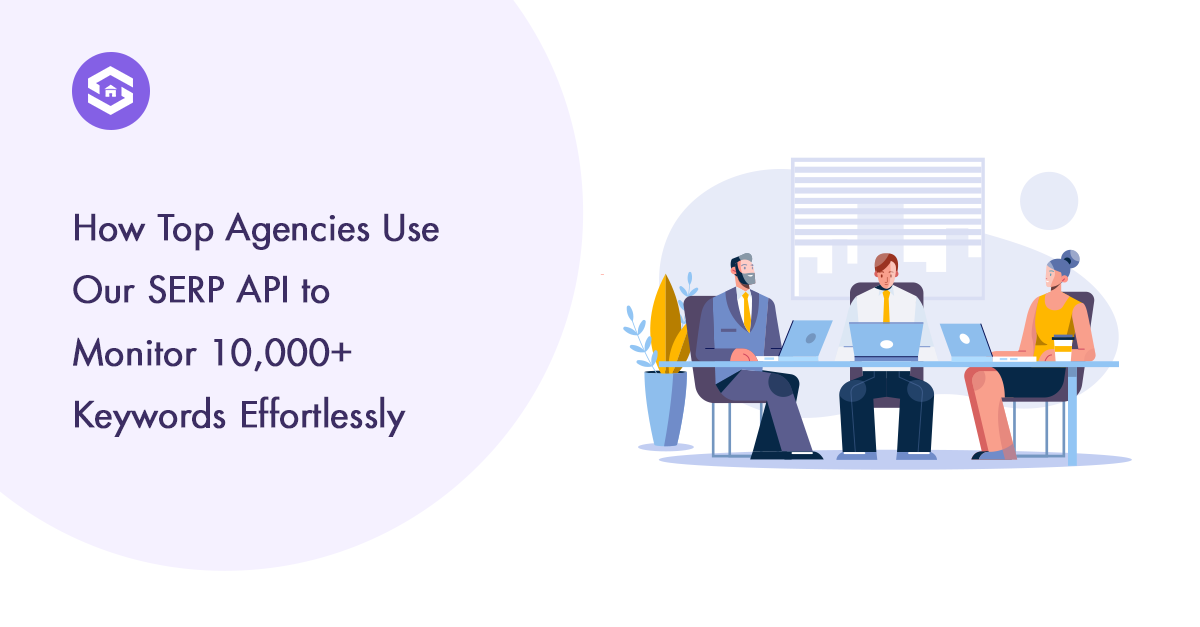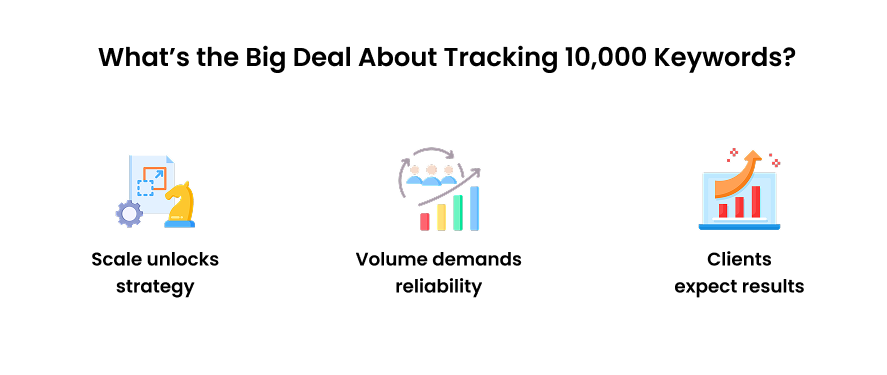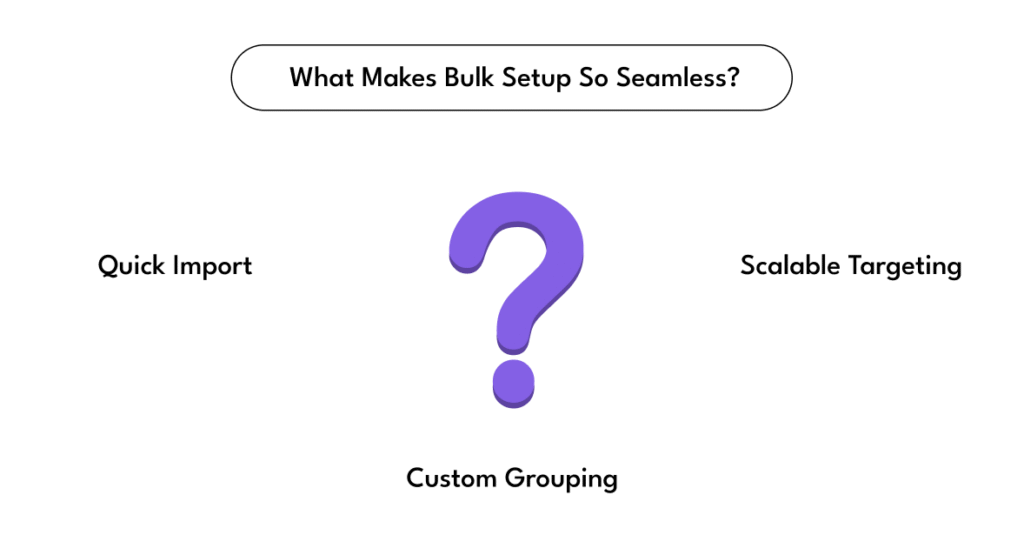From 100 to 10,000 Keywords: How Agencies Scale with Our SERP API
10 min read
10 min read

Table of Contents
Table of Contents
For digital marketing agencies that manage large-scale campaigns, keyword tracking is not just a task, but also a measure of success. Whether you monitor local SEO results or supervise the visibility of a national brand, tracking thousands of keywords efficiently is a daily need. This is where our SERP API comes in, offering accuracy, scalability and real-time information, all on a platform. That’s exactly why top-performing teams trust it when agencies use our SERP API to manage keyword data at scale.
Agencies usually face limitations with traditional tools when it comes to monitoring high-volume keywords. Slow data updates, location-based inaccuracies, and the inability to automate scale can affect performance. Our SERP API is built to eliminate these challenges. It allows agencies to collect clean and structured data for up to 10,000 keywords– without sacrificing speed or accuracy.
With support for real-time SERP results, localized tracking and automated keyword analysis, our API agencies enable faster reports, smarter insights, and more transparent results for your customers. As campaigns become more complex, having the ability to climb without compromising performance is critical. And with our system, this is not just possible – it is expected.
In the sections ahead, you’ll learn how top agencies integrate our SERP API into their workflow to scale operations, improve client reporting, and stay ahead of shifting SEO trends.

For most agencies, managing SEO is not about tracking a few dozen keywords—it’s about tracking thousands.
Let’s say you handle 15 clients. Each targets different products, services, and regions. Multiply that by mobile and desktop variations, and suddenly, tracking 10,000 keywords feels less like overkill and more like the new standard.
But here’s why it actually matters.
Scale unlocks strategy.
Tracking at this level allows you to understand what’s really working. You’re not just getting keyword ranking updates—you’re spotting trends, reacting to algorithm changes, and identifying search intent shifts across entire markets.
Volume demands reliability.
You can’t rely on tools that lag, break, or miss data. Agencies need consistent, real-time search engine data across every query. This is why enterprise teams now rely on robust SERP APIs that scale with demand while maintaining accurate SEO performance insights.
Clients expect results.
When you’re managing campaigns across 10,000 terms, every insight counts. A ranking drop in a low-volume keyword today could be a missed revenue opportunity tomorrow.
What sets winning agencies apart in 2025? It’s not just creativity or strategy—it’s the ability to act fast on accurate, scalable, and automated search data. That’s why more digital teams are making the shift. When agencies use our SERP API, they’re not just accessing raw data—they’re unlocking clarity, speed, and control at every level of their SEO operations.
But what truly makes our API agency-ready isn’t found in standard spec sheets. It’s found in how agencies actually use it in real-world scenarios.
1. Running Competitive Intelligence at Scale
Agencies don’t just look at client keywords—they also track competitors. With our API, they fetch data-rich SERP results across local and global regions to analyze who’s ranking, why, and how positions shift over time.
2. Improving Pitch Accuracy
Before onboarding a new client, agencies use the API to pull current keyword positions and SERP snapshots. This gives them instant data for proposals and helps them forecast effort vs. ROI—making the pitch data-driven and credible.
3. Faster Onboarding
New agency clients often bring messy keyword lists or unclear rank histories. Our system simplifies cleanup, allowing agencies to upload lists and immediately start tracking clean, structured data, without delays or dependencies.
Managing hundreds of keywords should not feel like a technical task. Whether you’re an SEO company, an in-house marketer, or a platform provider, you need to be able to put up large-scale tracking easily. That’s why our SERP API makes bulk tracking not only possible—but effortless.
Do you know how Local SEO works with a SERP API?
With built-in keyword batch processing, users can upload massive keyword sets in one go. No need to waste time configuring each keyword individually or building complex scripts to manage them.

Here’s how the process works—and why it’s a game-changer:
Once set up, rank position tracking starts immediately. Whether you’re tracking 500 or 50,000 keywords, the system adjusts to your needs without sacrificing speed or accuracy.
More importantly, the API provides structured, real-time SERP keyword data in formats that can be integrated straight into your dashboards or analytics tools. You spend less time cleaning data and more time applying insights.
So, if you’ve been using spreadsheets and clumsy technologies to track performance at scale, it’s time to upgrade to something faster, smarter, and designed for actual growth. Bulk does not have to imply complexity—especially when the process is designed with your workflow in mind.
Automation plays a central role in helping agencies manage complex reporting tasks across multiple campaigns. Instead of relying on manual updates, teams set up smart workflows that handle client reporting with precision and scale.
Agencies typically use tools that fetch real-time SERP data and push it into custom templates or dashboards. This allows reports to be updated automatically based on ranking changes, keyword performance, or traffic metrics.
To maintain branding consistency, many agencies use white-label reports. These are fully customizable reports that carry the agency’s logo, colour scheme, and formatting preferences, making them client-ready without extra formatting work.
Key automation features agencies rely on include:
By building these workflows once, agencies eliminate repetitive tasks and reduce errors. It also provides clients with a clear, dependable snapshot of how their efforts are performing—without the need for manual adjustments.
What is SERP tracking in SEO?
This streamlined approach not only saves time but also improves client satisfaction by ensuring consistency, transparency, and speed.
The online landscape changes quickly. Search engine results fluctuate due to algorithm changes, competitor activity, and seasonal trends. To respond effectively, agencies must acquire the most recent keyword data as soon as possible. A SERP API capable of handling high-volume keyword tracking ensures that thousands of keyword requests are processed simultaneously, providing real-time data essential for agile campaign adjustments.
Key aspects that contribute to speed include:
Fast data is valuable only if it is accurate. Precise keyword tracking performance guarantees that the rankings and metrics reported are reliable. Inaccurate data can mislead strategy, resulting in wasted effort and budget. Therefore, agencies rely on APIs that maintain consistent accuracy even when processing large datasets.
Important factors for accuracy include:
Handling thousands of keywords means facing variable demand. An ideal system scales seamlessly to accommodate peak periods without sacrificing speed or data quality. Stability is equally important; any downtime or performance dips can disrupt reporting cycles and damage client trust.
Agencies look for:
When an agency starts out, the tools and support it needs may seem minimal. But as campaigns scale, keyword volume grows, and client expectations rise, the level of assistance required transforms dramatically. That’s why having a support system that evolves alongside your agency isn’t just a benefit—it’s a necessity.
Unlike static solutions that treat all users the same, modern scalable API solutions are built with adaptability in mind. They’re designed to serve both the one-person marketing consultant and the enterprise-level agency managing thousands of campaigns across global markets. But what really sets a dependable partner apart is not just the robustness of the technology—it’s the responsiveness and intelligence of the support behind it.
Multi-Tiered Technical Support for API Users
Whether you’re debugging a single endpoint or integrating a new reporting workflow, support should be hands-on, contextual, and fast.
Dedicated Account Management for Agencies
As your needs grow, so should the quality of your relationship with the provider. Priority access and personalized assistance can make a big difference.
Documentation That Scales with Use Cases
From basic guides to advanced API orchestration strategies, the support materials should evolve with your complexity level—not just remain generic.
Onboarding and Success Planning
At scale, onboarding isn’t a single step. Ongoing success requires training, data planning, and strategy consultation to ensure your team gets the most out of every feature.
Proactive Monitoring and Recommendations
The best support systems don’t wait for you to raise issues—they identify potential friction points in advance and help you optimize before performance dips.
Ultimately, real support understands that an agency’s growth isn’t just about more clients—it’s about smarter operations, faster resolutions, and the confidence that someone has your back as you scale. When your SERP API provider offers technical support for API users that adapts to your growth curve, your path from startup to industry leader becomes significantly smoother.
Agencies that invest in a scalable SERP API aren’t just saving time—they’re future-proofing their workflows. With constant algorithm shifts and rising keyword demands, the ability to adapt quickly becomes a competitive edge. That’s exactly what happens when agencies use our SERP API to streamline rank tracking and stay ahead of the curve.
Over time, the advantages of an intelligent rank tracking setup compound:
The value isn’t just in the API response—it’s in what you can build with it: better client relationships, smarter optimization strategies, and a clear edge in high-volume environments.
For any agency serious about staying ahead in search visibility, an API like this isn’t a tool—it’s a growth engine.